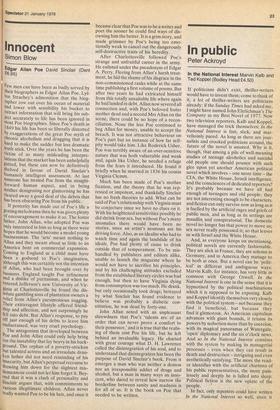Innocent
Simon Blow
Edgar Allan Poe David Sinclair (Dent £6.95)
Few men cantave been as badly served by their biographers as Edgar Allan Poe. Lytton Strachey's admonition that the biographer row out over his ocean of material and lower with sensibility his bucket to extract information that will bring his subject accurately to life has been ignored in 1flost Poe biographies. Since Poe's death in 1849 his life has been so liberally distorted by exaggerations of the great Poe myth of chronic alcoholism and drugging that it is hard to make the sadder but less dramatic truth stick. Over the years he has been the victim of so many misleading interpretations that the market has been unhelpfully gutted, but these can now be definitively Shelved in favour of David Sinclair's humanely intelligent assessment. At last someone has treated Poe from the straightforward human aspect, and in being neither denigrating nor glamorising he has Cleared away a good deal of the debris that has been obscuring Poe from his public.
If posterity has made out of Poe's life a grating melodrama then he was given plenty of encouragement to make it so. The foster father, John Allan, who adopted Poe was only interested in him so long as there were hopes that he would become a model young businessman. The 'arts' meant nothing to Allan and they meant about as little to an America bent on commercial expansion. Coming to England as a child must have been a godsend to Poe's imagination, although this was certainly not the intention of Allan, who had been brought over by business. England taught Poe refinement and a dislike of puritanism, and when he entered Jefferson's new University of Virginia at Charlottesville he found the dissolute gambling sons of plantation owners a relief from Allan's parsimonious nagging. Their extravagant lifestyle offered friendship and affection, and not surprisingly he fell into debt. But Allan's response, to pay off just enough of his debts to leave him embarrassed, was very cruel psychology.
The antagonism that developed between Poe and John Allan could only help bring out the instability that lay heavy in his background. The orphan of a poverty-stricken but talented actress and an irresolute drunken father did not need reminding of his Insecurity, but Allan's perpetual recourse to dressing him down for the slightest misdemeanour could not let him forget it. Beyond that it was a clash of personality and Sinclair argues that, with commitments to Various illegitimate children, Allan never really wanted Poe to be his heir, and once it
became clear that Poe was to be a writer and poet the sooner he could find ways of disowning him the better. It is a grim story, and made grimmer by Poe's being too emotionally weak to cancel out the dangerously self-destructive traits of his heredity.
After Charlottesville followed Poe's strange and unfruitful career in the army. He enlisted under the pseudonym of Edgar A. Perry. Fleeing from Allan's harsh treatment, he hid the shame of his disgrace in the non-commissioned ranks while at the same time publishing a first volume of poems. But after two years he had extricated himself from this totally unsuitable life where again he had landed in debt. Allan now severed all connection and, with Poe's beloved foster mother dead and a second Mrs Allan on the scene, there could be no hope of a reconciliation. None the less Poe continued to beg Allan for money, unable to accept the breach. It was not attractive behaviour on Poe's part but an instance of how far selfpity would take him. Like Roderick Usher, Poe was terribly aware of an over-sensitive nature that was both vulnerable and weak and, again like Usher, he needed a refuge from the fears it introduced. He found it briefly when he married in 1836 his cousin Virginia Clemm.
Much has been made of Poe's mother fixation, and the theory that he was repressed or impotent, and thankfully Sinclair has no fresh theories to add. What can be said of Poe's relationship with Virginia must be conjecture since we have no clues on it. With his heightened sensitivities possibly he did shrink from sex, but without Poe's many anomalies there would have been no stories, since an artist's neuroses are his driving force. Also, as an idealist who had to watch time and again the landslide of his ideals, Poe had plenty of cause to drink outside that of temperament. To be mishandled by publishers and editors alike, unable to launch the magazine where he would not have to sacrifice his principles, and by his challenging attitudes excluded from the established literary circles was bad enough, but then to have Virginia dying from consumption was too much. He drank, but only occasionally took drugs; betrayed by what Sinclair has found evidence to believe was probably a diabetic constitution, he was dead by forty-one.
John Allan noted with an unpleasant shrewdness that Poe's 'talents are of an order that can never prove a comfort to their possessor,' and it is true that the realising of them cost Poe his life, but he left behind an invaluable legacy. He charted with great courage what D. H. Lawrence called the disintegration of his soul, and to understand that disintegration has been the purpose of David Sinclair's book. From it emerges a man who was neither a demon nor an irresponsible addict of drugs and alcohol, but a man in many ways an innocent, who dared to reveal how narrow the borderline between sanity and madness is for all of us. It is the book on Poe that needed to be written.


































 Previous page
Previous page